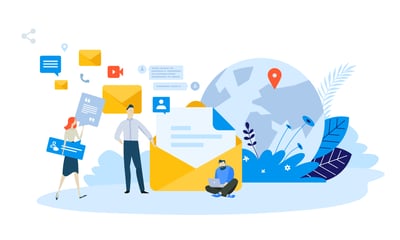September 5, 2025
 by Kamaljeet Kalsi / September 5, 2025
by Kamaljeet Kalsi / September 5, 2025

Capturing and commanding customer attention when they’re constantly overloaded with content is like wishing for snow in summer. It’s rare but not impossible. And this rarity is what makes video stand out as a powerful vehicle for genuine customer engagement.
G2’s The AI Marketing Mind 2025 underscores this shift, predicting a 4x increase in the adoption of AI-assisted video and multimedia content. Increased investment in video isn't just going to be a mere trend; it's a fundamental transformation in how businesses connect with their audiences.
Historically, video production was often a resource-intensive endeavor, placing it out of reach for many. However, AI has democratized this process, empowering brands to create high-quality video content with more speed and efficiency.
TL;DR: Everyone is either creating video content or wants to, and no matter which group you fall into, you’ll walk away from this article with an action plan / with tips for a high-impact video strategy.
To help supercharge your video strategy, we interviewed industry leaders from Canva, VEED, and LinkedIn and used proprietary G2 data to unearth stark observations, emerging strategies, and practical applications.
Video software has evolved from being a niche tool to an integral part of marketing, creative, and social media efforts across organizations. Brands leverage these platforms for everything from initial content creation to sophisticated AI-powered generation and editing.
Canva uses its own product internally across social media, creative, and marketing teams. The Canva team uses AI-powered features like "Highlights" to automatically cut shareable clips from longer videos, and "Beat Sync" to edit clips in sync with the beat of a song. This allows for seamless integration from ideation to publication.
VEED’s team considers video a core part of how they work, framed through three product pillars: generate, edit, and repurpose. (More on this ahead!)
The teams rely on features like subtitles and brand kits for quick, publish-ready content generation, and experiment with AI avatars and text-to-video for scaled production.
Daily use of editing features, including a new AI agent, makes prompting quick changes easier, such as resizing for social media, removing silences, or adding music, thus reducing friction. Repurposing involves regularly clipping content like webinars and podcasts for social or paid campaigns, which helps maximize existing assets.
Video is now deeply embedded across VEED's organization as well as business use.
“From quick internal updates to product explainers and social clips, teams are using VEED to communicate faster and stay on brand without needing formal production or big budgets.”
Lisa Vecchio
Enterprise Marketing Director at VEED
AI promises to enhance efficiency and impact with advanced features and integrations that flow into broader workflows. Here are some golden nuggets from Canva and VEED’s leaders on how they use AI for marketing.
Canva's rich ecosystem of apps and integrations simplifies the video journey from ideation to creation to publication.
“The opportunity for marketers isn’t to create more video content. It’s to create a workflow where anyone can ship useful content quickly and consistently.”
Lisa Vecchio
Enterprise Marketing Director at VEED
VEED's approach to video revolves around three pillars: generate, edit, and repurpose.
According to LinkedIn's Director of Product Marketing, Elaine Theios, video content is growing at twice the rate of other formats on its platform. This shift in B2B video engagement and content preferences is palpable. Just open LinkedIn and you’ll see what I mean.
Much of B2B video everywhere else still appears and feels generic: polished, overly scripted, and centered around talking heads. What's gaining traction on platforms like LinkedIn now feels more like B2C content: shorter, vertical, and more human.
Relatable, human, and concise is in. Mirroring successful B2C strategies is in.
Hear it directly from the brand itself.
Elaine observed that marketers are using a diverse mix of video content on the platform, from product demos to customer testimonials. Teams are increasingly repurposing existing video to reach and engage target audiences.
“Video is rich, flexible, and engaging, and our customers are finding it’s a great way to connect with their audience in a professional context.”
Elaine Theios
Director of Product Marketing at LinkedIn
So, what kinds of video content are actually moving the needle for B2B brands?
Video is also proving powerful from a product education standpoint, with B2B brands leaning on it to simplify complex solutions and build trust.
“Content like customer testimonials and webinar snippets are popular for B2B brands, and we see more tangible content like shorter-form product tutorials perform well, too.”
Emma Robinson
Head of Business Marketing at Canva
Emma pointed to a lighthearted Canva video post about social media managers defending being on their phones. The relatable video resonated widely, racking up about 800,000 views and reaching roughly 1.7 million people.
Source: Canva LinkedIn page
Videos under 90 seconds, especially when captioned and designed to feel natural to the LinkedIn feed, perform best.
“The videos that get real engagement are the ones that are useful and relatable. A quick demo. A behind-the-scenes moment. A team member sharing a point of view.”
Lisa Vecchio
Enterprise Marketing Director at VEED
Lisa Vecchio also shared VEED's strong emphasis on employee-led content, with social, product, and leadership teams creating their own videos.
Tools like AI editing, which remove filler words or adjust eye contact, make it easier for anyone to appear confident, contributing to a trustworthy rather than overproduced video. The brands that capture and hold attention empower their people's voices, instead of solely pushing corporate messages.
One type of video seeing particular success on LinkedIn is content related to customers' events.
Events are, in Elaine’s words, a "real sweet spot" for LinkedIn," and live streaming event content is proving to be a great fit for B2B marketers on the platform.
“The thing I find most promising about what we’re seeing with our customers’ use of video is how it works in a campaign with other formats to drive business outcomes.”
Elaine Theios
Director of Product Marketing at LinkedIn
She discussed how LinkedIn's Event Ads offering makes it possible to scale event reach to optimal audiences. The result? A 131% higher click-through rate and 6x the engagement rates compared to video ads alone.
Dialpad’s results highlight what’s possible when video is integrated strategically. G2 insights show how this momentum is playing out more broadly across B2B marketing.
G2 data and market analysis underscore the rapid ascent of video in B2B marketing, especially within AI-powered content creation. The Video Content Creation category on G2 reveals user sentiment that is overwhelmingly positive. And while growth is surging, full-scale adoption still lags behind the hype.
G2’s review data surfaces clear patterns about how AI video tools are being adopted, used, and valued by B2B teams today.
1. High enthusiasm, low saturation
Over 250 reviews highlight core uses like video creation and editing, but only 81 reviews include any insight into adoption rates. Among those, 75% said that less than half of the users at their company have adopted the tool.
Tip for CMOs, chief brand officers, and tech buyers: Excitement ≠ adoption
AI video tools are becoming brand enablers, praised for giving even small teams creative autonomy to drive consistency and message control.
2. AI video features spark interest but aren’t yet the default
Just 15% of reviewers explicitly mention AI features like avatars or text-to-video. But when they do, it's tied to speed, creative scale, and reduced production cycles.
Tip for brand and content leaders: These features are disproportionately valuable, even if not yet commonly used.
3. Users want fast results and get them
Among the 67 reviewers who reported return-on-investment (ROI), over 60% saw returns in under 6 months. This aligns with what Canva, VEED, and other tools claim: AI video creation cuts friction and boosts output.
Tip for agile teams: These tools are shortening creative feedback loops, allowing for faster experimentation across the funnel, from awareness videos to onboarding and sales enablement. Fast payback makes these tools ideal for lean, high-velocity content strategies.
4. Ease of use shines; setup slightly lags
The average ease of use rating is 6.7/7, while ease of setup drops to 6.2/7. Reviewers love the intuitive user interface (UI), but some flag onboarding and integrations as growth areas.
Tip for vendors: Frictionless setup is table stakes. Buyers want tools that work without IT support. AI capabilities drive purchasing, but explainability, editing control, and integration remain weak spots. Buyers want AI, but they also want to fine-tune and trust it.
5. Switching from slide decks to smart video
Many reviewers mentioned switching from PowerPoint or manual video tools, especially in marketing, product, and training teams. The shift to video isn’t just cosmetic; it’s about replacing static, siloed workflows with scalable, dynamic ones.
Tip for business storytellers and enablement leaders: Video is becoming the new deck. Teams are using it to simplify complex ideas, modernize training, and create more persuasive sales narratives — making video not just a format, but a strategy shift.
This shift is backed up by what users consistently highlight in their reviews about the features that make video creation fast, simple, and scalable.
AI now goes beyond being “just a feature” to becoming an accelerator for creativity at scale.
As video continues to reshape B2B engagement, especially in event marketing, CMOs are under pressure to create not just informative moments but unforgettable ones. Video is increasingly central to this shift, emerging as one of the most scalable ways to deliver multisensory impact across virtual, hybrid, and in-person formats.
While in-person events are back in a big way with 8 in 10 attendees saying they prefer them — their cost, complexity, and slow payback make brands hesitant to go all in.
G2 data reinforces this challenge: ROI timelines for event software average 10 to 13 months, reflecting the long sales cycles and multi-stakeholder decisions tied to event-driven deals. In other words, even when the execution is flawless, events (and the tools behind them) don’t always deliver a quick win.
That’s where video steps in. By repurposing event moments into on-demand, bite-sized, and shareable content, B2B marketers can extend impact far beyond the event itself. And we all know that even the most immersive experience won’t guarantee immediate conversion. But video ensures those moments keep paying dividends long after the lights go down.
Video is quietly becoming the most accessible form of multisensory marketing in B2B. It combines sound, visuals, pace, and human emotion — all key to creating memorable experiences. While physical events can offer smells, textures, and spatial experiences, video translates these into emotional cues and creative storytelling, especially for virtual attendees.
As Elaine points out, video is thriving within events on LinkedIn, and its rise reflects the shift toward experience-led engagement. Whether it’s live-streamed customer events, AI-powered explainers, or repurposed webinars, video is the new front row seat at the multisensory B2B table.

Source: Exclusive G2 data
In B2B events, video is the one sensory layer that travels well on-stage, on-screen, and on-feed.
The future of B2B video marketing is characterized by continued blurred lines within the industry, driven by AI, and a heightened focus on authenticity, utility, and building lasting relationships.
Canva predicts that the line between B2B and B2C video marketing will continue to blur as business leaders expect the same creativity and production quality as consumers.
We will see more B2B brands use AI to personalize video content at scale, creating variations tailored to specific industries, regions, or roles. There's also an observed rise in video content from C-suite and other executives actively building personal brands and creating their own content.
VEED predicts a clear divide between brands that treat video as an asset and those that treat it as a system. Winners will shift from one-off campaigns to connected content systems, focusing on small stories, fast feedback, and repeatable results.
Video will no longer be confined to the marketing team. It will appear in sales outreach, internal communications, customer education, and community efforts, with AI agents and edit-by-script tools facilitating broader participation. Audiences will expect content to feel real, fast, and human, not perfectly produced. The B2B brands that stand out will be the most useful, not necessarily the loudest. AI video isn't about replacing creativity but removing elements that slow it down.
Two of LinkedIn’s leading voices on B2B marketing share what’s next for video—and how your brand can stay ahead of the curve.
Elaine Theios is closely tracking three emerging shifts.
Looking to build brand presence on LinkedIn through video? Here’s Tyrona Heath’s strategic framework for what’s working right now:
The current trajectory indicates that B2B video will become more intertwined with broader brand, product, and marketing strategies. By embracing these insights and actionable steps, enterprises can transform video from a challenging endeavor into a strategic superpower, driving deeper engagement and measurable business impact.
Now that you’ve got an inside look at how leading B2B brands use AI and video to connect authentically and scale smart, are you ready to take the next step? Download ‘The AI Marketing Mind 2025’ report for strategies you can act on today.
Edited by Supanna Das
Kamaljeet Kalsi is Sr. Editorial Content Specialist at G2. She brings 9 years of content creation, publishing, and marketing expertise to G2’s TechSignals and Industry Insights columns. She loves a good conversation around digital marketing, leadership, strategy, analytics, humanity, and animals. As an avid tea drinker, she believes ‘Chai-tea-latte’ is not an actual beverage and advocates for the same. When she is not busy creating content, you will find her contemplating life and listening to John Mayer.
Email is one of the go-to forms of communication for many companies who want to connect with...
 by Michael Bibla
by Michael Bibla
Solutions often meet us at intersections.
 by Nanditha Vijayaraghavan
by Nanditha Vijayaraghavan
You have come across hundreds of long lists of growth strategies.
 by Patrick Whatman
by Patrick Whatman
Email is one of the go-to forms of communication for many companies who want to connect with...
 by Michael Bibla
by Michael Bibla
Solutions often meet us at intersections.
 by Nanditha Vijayaraghavan
by Nanditha Vijayaraghavan


